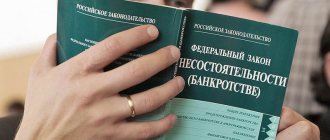Loss of ability to work, long-term illness, job layoffs and other financial difficulties lead to the fact that a citizen cannot pay loans. He has to hide his income from the bailiffs and evade the persecution of collectors.
In 2020, individuals had the opportunity to free themselves from debt obligations through insolvency proceedings. However, this does not mean that the debtor can legally default on loans. Debts are written off subject to compliance with the mandatory conditions established by the Bankruptcy Law in Russia.
Under what conditions is it possible for a citizen to go bankrupt?
- Step 1 – Preparation of documents for applying to the arbitration court
- For the debtor and his family
The Law on Personal Bankruptcy means bankruptcy, recognized by an arbitration court, as the inability of an individual to pay all debts.
To recognize a citizen as financially insolvent, he must meet three criteria:
- have debts on loans, taxes, and other financial obligations of 500,000 rubles. and higher;
- be overdue on payments for more than three months in a row;
- to be insolvent, that is, to lose income sufficient to pay debts due to illness, disability, or loss of work.
It is important that the citizen’s insolvency occurs for objective reasons. If he deliberately conceals income and assets for the purpose of writing off debts through financial insolvency proceedings, such a statement may be considered intentional. The court concludes that the conditions for declaring a citizen bankrupt are not met and refuses to declare him financially insolvent.
You should know! The legislation provides for administrative and criminal liability for fictitious bankruptcy (Article 14.12 of the Code of Administrative Offenses of the Russian Federation and Article 196 of the Criminal Code of the Russian Federation). Minor offenses are punishable by an administrative fine. If his actions caused major damage to creditors, the citizen may be imprisoned for up to six years.
Growing tax debt is a direct path to bankruptcy
Also in judicial practice, there are cases when the court refused to write off debts to creditors to a bankrupt on the basis of the fact that the amount of his total monthly income was less than the loan obligations subject to monthly repayment. What does judicial practice say if you have partially repaid your debts, but still have obligations to creditors? In this case, the issue of restructuring is usually considered.
Attention
If there is nowhere else to get money from, then the issue of bankruptcy, sale of property and debt write-off will be considered. Useful tips Bankruptcy helps to write off debts, but it also has negative sides.
Having weighed all the pros and cons, you should decide to take this step only if the situation is hopeless - no work, no money, no property... There are only debts amounting to half a million rubles.
Pros and cons of bankruptcy procedures for individuals
Before declaring yourself financially insolvent, you should understand what the pros and cons of bankruptcy status are.
pros
The insolvency of a citizen, recognized by the court, allows significant amounts of debt to be written off if it is hopeless. After completion of the procedure, creditors lose the right to demand payment of loans, credits, and taxes from the debtor.
In the case where a person intends to pay off the entire debt, however, the bank does not give him an installment plan, it can be obtained in an insolvency procedure. The court approves a schedule according to which the citizen transfers money to creditors using feasible payments. Once the debt is paid off, the legal case is terminated.
Minuses
Not in all situations bankruptcy has a positive effect on a person's life. If the procedure is used incorrectly, negative consequences may occur:
- The citizen bears additional costs to pay for the procedure. Before going to court, you need to deposit 25,000 rubles, pay for publication in the EFRSB and the Kommersant newspaper, state fees, and legal support services. As a result, the citizen pays from 100,000 rubles. for relief from debts, which is unprofitable with small debts.
- After a court decision is made, a person loses control over his accounts. All income is managed by a financial manager appointed by the court. He allocates money to the citizen for urgent needs within the subsistence level. The remaining funds are used to pay off debts to creditors.
- The debtor may lose property because it is sold to pay off debts. After a bankruptcy decision is made, movable and immovable things are placed at the disposal of the financial manager, who sells them at auction. The proceeds are transferred to creditors.
We must remember! Some citizens think that in order to preserve property it is enough to transfer it to relatives. However, it will not be possible to preserve property in this way. When filing an application with the arbitration court, the debtor is obliged to report all transactions involving the sale of property for three years. Subsequently, the financial manager checks whether the transactions are aimed at concealing the citizen’s property. If this fact is confirmed, the transaction is disputed in court and the property is returned to the debtor for further sale at auction.
Beware, scammers
Individuals who find themselves in a difficult situation should be careful not to make it worse. Federal Law No. 476, which allows individuals to initiate their financial insolvency, was adopted relatively recently, and many seek to profit from citizens’ ignorance of the legislation on this issue.
On the Internet you can often find advertisements from various companies promising complete write-off of debts during the bankruptcy process. Of course, they require a certain fee for such a service. The debtor believes that he will really get rid of the debt, so he agrees to the reward. Ultimately, the case is not resolved in his favor, and he also cannot return the money spent.
In addition, you can read many articles where “experts” claim that the new law will help debtors get rid of debt and start a new life. Such analyzes are compiled by amateurs who do not themselves have much knowledge of the law, so following their advice is not only pointless, but even dangerous, since there is no guarantee that the debtor will not worsen his situation by going to court.
Latest changes to the Bankruptcy Law
Due to high costs, insolvency proceedings are not available to all debtors. With the most economical option, the cost of bankruptcy is from 50,000 rubles.
From September 1, 2020, changes will come into force in the Bankruptcy Law regarding the introduction of simplified bankruptcy for citizens. Citizens with a debt amount of 50,000 to 500,000 rubles will be able to declare themselves financially insolvent free of charge without going to an arbitration court or involving a financial manager.
Settlement agreement with the bank
You should not count on writing off your existing debt before going to court. Often, individuals have to repay the loan in different ways. Therefore, first it is worth considering such a solution to the problem as a settlement agreement with a banking or other financial organization. The procedure is unprofitable for both parties, so finding a compromise solution does not seem difficult in the vast majority of cases.
You need to come to the company’s office and talk with its representatives. State the reason why you cannot fulfill the terms of the contract, as well as your requirements for concessions. Reputable companies can reduce the amount of mandatory payment or give a short deferment without charging penalties and fines.
The bankruptcy procedure for citizens in 2020: step-by-step instructions
Bankruptcy of citizens is a long process consisting of several stages. Let us examine in detail the entire procedure established by the Law on Insolvency of Individuals.
Step 1 – Preparation of documents for applying to the arbitration court
To declare oneself financially insolvent, an individual will need to prepare documents for the arbitration court (Article 2.134 of Law No. 127-FZ)
The list of bankruptcy documents is as follows:
- documents confirming the existence of a debt (writs of execution, court orders, unfulfilled contracts, etc.);
- a certificate from the tax authority confirming the absence of individual entrepreneur status;
- list of creditors;
- a list of movable and immovable things owned by an individual;
- documents on ownership of property;
- a list of transactions for the sale of a citizen’s property completed within three years before applying to the court for recognition as insolvent;
- information about income for three years;
- certificates of accounts and cash balances on them;
- SNILS;
- TIN certificate;
- marriage and birth certificates;
- marriage contract (if any);
- agreement on the division of joint property of spouses.
Before submitting documents to the court, the applicant pays the state fee for bankruptcy of an individual. The mandatory payment amount is 300 rubles. The receipt is provided to the court.
Step 2 – Selecting an SRO from among whose members the financial manager will be approved
The insolvency procedure must be accompanied by a financial manager who is professionally engaged in this activity and appointed by the court (Article 213.9 of Law No. 127-FZ).
The financial manager carries out the following work:
- identifies the debtor's property;
- checks whether there are signs of deliberate or fictitious bankruptcy;
- maintains a register of creditors;
- organizes a meeting of creditors;
- controls the implementation of the debt restructuring plan of an individual;
- sells property to pay off debts.
Thus, the financial manager is endowed with broad powers that allow him to influence the outcome of the procedure. His participation is mandatory, therefore, before submitting an application, you should decide from which self-regulatory organization of insolvency administrators (SRO) the financial manager should be selected. The list of SROs can be found on the EFRSB website.
Step 3 – Filing an application to declare the debtor insolvent
In accordance with Article 37 of the Bankruptcy Law, an application for recognition of insolvency is drawn up in writing. The text must include the following information:
- name of the arbitration court at the place of residence of the debtor citizen;
- Full name of the citizen, his residence address, TIN, email, contact telephone number;
- the amount of debt for taxes, insurance premiums, contractual obligations, compensation for harm;
- justification for the impossibility of repaying all debts;
- information about claims against a citizen being considered by the courts;
- data on enforcement documents held by bailiffs;
- list of property;
- bank account number;
- the name of the self-regulatory organization of arbitration managers, from among whose members the financial manager will be appointed.
At the end of the application, a list of attachments is compiled, then dated and signed.
Sample of a citizen's application for bankruptcy
Step 4 – Consideration of the case in court and introduction of insolvency procedures
After accepting the application, the arbitration court schedules the first court hearing, at which the issue of starting bankruptcy and appointing a financial manager who will conduct the entire procedure is decided.
The insolvency procedure is carried out in two stages:
- Debt restructuring. A restructuring plan with a debt repayment schedule is drawn up and approved at the first meeting of creditors and in court. Within 36 months, the citizen pays debts according to schedule. If solvency is not restored, the court moves on to the next stage.
- Sale of property. A decision is made on bankruptcy of an individual. The financial manager describes and evaluates the debtor's property and challenges suspicious transactions. Within six months, the identified property is sold at auction. The proceeds go to pay off the debt.
If there is not enough property, the meeting of creditors decides to complete the procedure.
Step 5 – Completion of bankruptcy proceedings
At the last meeting, the issue of terminating bankruptcy is considered. The court examines the financial manager's report and, based on it, completes the procedure. The decision taken is formalized in the form of a ruling to terminate the proceedings.
Tax avoidance
Everyone is required to pay taxes, including bankrupt people. For example, a resident of Ulyanovsk filed an application to the court to declare her bankrupt. At the same time, she hid the fact that she committed tax crimes several years ago. A criminal case was opened against her for tax evasion. Subsequently, the investigator discontinued the proceedings due to the expiration of the statute of limitations. At the same time, releasing a person from criminal liability does not mean that he should not transfer taxes to the budget. Therefore, the Federal Tax Service went to court, which collected the entire debt from the citizen.
Considering that the bankrupt never paid taxes, and also hid this fact from the financial manager and the court, the arbitration did not release the citizen from her obligations to the Federal Tax Service. (Resolution of the Eleventh Arbitration Court of Appeal in case No. A72-8784/2017 dated April 27, 2018).
By the way, the obligation to pay all taxes after filing bankruptcy arises not only if a citizen is brought to criminal liability. The law generally doesn’t care whether a person is bankrupt or not, whether he was convicted of tax evasion, or whether he escaped criminal liability. And if during bankruptcy the fiscal authorities for some reason did not submit an application to include their claims in the register of creditors, then after the end of the procedure they calmly submit an application to the district court and collect taxes in an administrative manner. (Decision of the Borovicheskiy District Court of the Novgorod Region in case No. 2a-1659/2017 dated November 8, 2017).
Consequences of bankruptcy proceedings
Once insolvency proceedings are completed, there are consequences for the debtor, his family members and creditors.
For the debtor and his family
If the debtor has outstanding debts, they are written off completely.
The following debts are officially considered repaid:
- loan debts;
- surety;
- debts on taxes and fees;
- obligations under sales and purchase agreements, leases and other transactions.
If a citizen is married, then a division of joint property can be carried out, which affects the interests of the second spouse. Children who are dependent on the debtor receive much less money for their maintenance.
Within five years, a citizen must inform the bank about his status when applying for a loan. The insolvency procedure cannot be started again, and the rule on debt relief does not apply.
The legislation on bankruptcy of individuals prohibits a citizen from holding leadership positions in an organization and registering an individual entrepreneur for three years.
For creditors
Once the procedure begins, creditors are deprived of the right to collect debts in the usual manner. Debt claims are included in the restructuring plan and repaid according to schedule.
If there are insufficient funds, the restructuring plan is canceled and the sale of the debtor’s property begins. Next, the creditors' claims are repaid in a certain order (Article 213.27 of Law No. 127-FZ).
As a rule, a citizen’s property is not enough to pay off all debts. Therefore, creditors have to bear losses due to non-repayment of funds.










